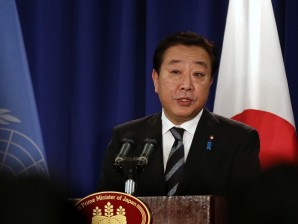
Prime Minister of Japan Yoshihiko Noda addresses a news conference in New York Wednesday, September 26, 2012. AP/Craig Ruttle
NEW YORK — Japan’s prime minister said Wednesday his nation is not willing to compromise in its territorial dispute with China over remote islands that have spawned violent anti-Japan protests.
But Prime Minister Yoshihiko Noda said that Japan would respond calmly and make sure it does not adversely affect bilateral relations between the two Asian powers.
Noda was speaking at a news conference after telling the U.N. General Assembly that issues should be resolved peacefully, according to rule of law, and not through force.
Senior diplomats of China and Japan met both in New York and Beijing Tuesday, seeking to mend ties frayed by the spat over the Senakakus islands, called Diaoyu by China, that has raised tensions between them to their highest level in years.
The islands, held by Japan, are uninhabited but sit astride rich fishing waters and potentially large reserves of natural gas.
“So far as the Senkaku islands are concerned, they are the inherent part of our territory, in light of history and international law. It’s very clear,” Noda said. “There are no territorial issues as such, therefore there could not be any compromise that may mean any set back from this basic position.”
He added that both in the case of the Senkakus, and separate islands that are subject of a spat between Japan and fellow U.S. ally South Korea, Japan would “maintain reason and try to resolve the issue calmly.”
Noda defended his government’s purchase of some of the islands from a private Japanese citizen two weeks ago as an attempt to ensure their “stable management” but conceded “it seems that China has yet to understand that.” He said violence in the protests — that have targeted Japanese-owned stores and factories in China — could not be condoned in any circumstances and that Japan had demanded China protect Japanese citizens and property.
Chinese Foreign Ministry spokesman Qin Gang responded to Noda’s comments by saying they ignored historical casts and international laws.
“The country concerned must face up to history and earnestly abide by international legal principles, and cease all actions that infringe the territorial integrity and sovereignty of other countries,” he said in a statement issued Thursday.
Despite the flurry of diplomacy, it is far from clear that the crisis has passed. China could send more vessels to challenge Japanese control of the islands, raising the possibility of armed conflict arising from mistake or miscalculation. Taiwan, which also claims the islands, has also weighed into the dispute.
On Tuesday, Japanese and Taiwanese coast guard cutters exchanged water cannon blasts just off the islands.
China’s official Xinhua News Agency reported that Chinese Foreign Minister Yang Jiechi told Japanese counterpart Koichiro Gemba in New York Tuesday that the Japanese government’s island purchase constituted “a serious challenge to the post-war international order.”